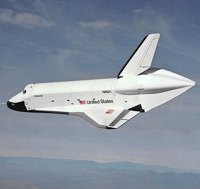Here lies the space shuttle. She kept the U.S. human spaceflight program alive after the euphoria of the Apollo missions. She led the way to reusable space flight. She provided jobs for armies of engineers and technicians. She also made human spaceflight seem routine -- and in the end, that's what killed her. But as with the retirement of the Apollo program -- which was accompanied by less hand-wringing and fewer tears shed than that of the shuttle -- it is time, not to mourn the shuttle's passing, but to support the innovation that NASA and, more importantly, American industry are capable of. The truth is that the shuttle's time was already over.
To be sure, there are still dedicated space enthusiasts, ranging from eager schoolchildren fascinated with all things space-related to baby boomers nostalgic for the Apollo era. But once the majority of Americans -- those focused mainly on paying their monthly bills -- stopped knowing the names of the astronauts who journey into the harsh environment of space and stopped getting up early or turning on televisions at work to view launches, the routine surrounding the shuttle became the equivalent of smoker's cough: something no one talks about, but that can still kill you.
Americans tend to take "routine" for granted -- just look at the roads, bridges and crumbling infrastructure around the country. Paying for anything routine is shunned by opponents of big government and is secondary for supporters of "people programs." With regard to technology, the U.S. government is expected to support innovation -- in airplanes, computers and the Internet -- and then hand things over to the private sector for continued investment once it becomes routine.

